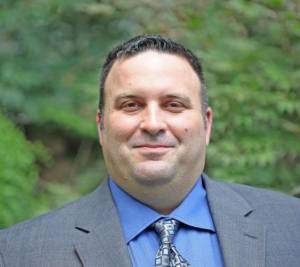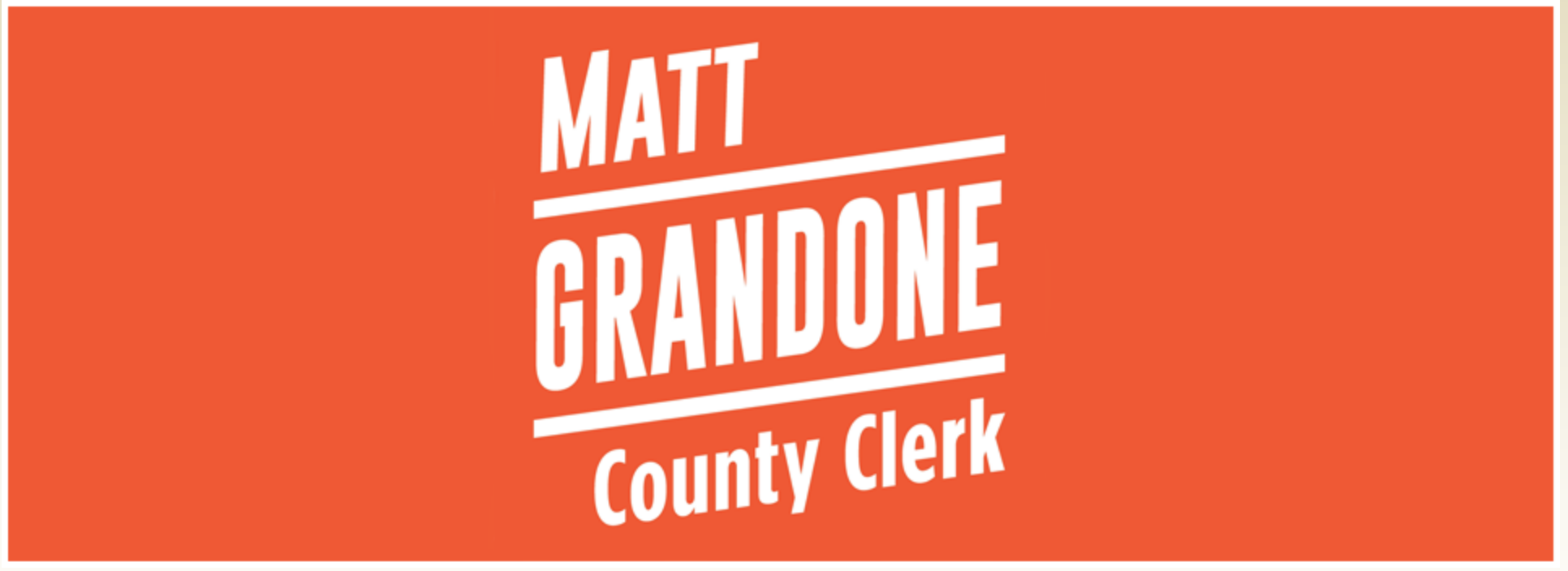Candidate for county clerk, Matt Grandone, was kind enough to answer some of my questions regarding his plans for the county clerk position. Mr. Grandone is currently in a challenged primary that will be decided on March 20.
Smile Politely: For those readers who don’t know you, could you tell us a bit about your background and why you feel you would be a good fit for Champaign County Clerk?
 Matt Grandone: I was born and raised in Urbana, graduated from Urbana High School and have a BA from Illinois Wesleyan University. Prior to coming to work as the Director of Training in the Champaign County Clerk’s office, I spent 10 years working for a non-profit on the research side of substance use and mental health treatment. I’ve spent the last three-and-a-half years working for current Champaign County Clerk Gordy Hulten, not only in assisting in the running of elections but as a member of the office’s management team in charge of making sure the office continues to move in the right direction to provide high-quality service to residents of Champaign County. I’ve been fortunate to play an integral role in the voting experience for Champaign County voters for the past six elections, including the largest election in Champaign County history, the November 2016 general election. (Photo from mattgrandone.com)
Matt Grandone: I was born and raised in Urbana, graduated from Urbana High School and have a BA from Illinois Wesleyan University. Prior to coming to work as the Director of Training in the Champaign County Clerk’s office, I spent 10 years working for a non-profit on the research side of substance use and mental health treatment. I’ve spent the last three-and-a-half years working for current Champaign County Clerk Gordy Hulten, not only in assisting in the running of elections but as a member of the office’s management team in charge of making sure the office continues to move in the right direction to provide high-quality service to residents of Champaign County. I’ve been fortunate to play an integral role in the voting experience for Champaign County voters for the past six elections, including the largest election in Champaign County history, the November 2016 general election. (Photo from mattgrandone.com)
SP: While the roles of a county clerk are numerous, they are not always entirely clear to the public. As clerk of Champaign County, what will your duties be?
Grandone: Our highest profile function is serving as the election authority for any and all elections occurring within Champaign County. Our office is in charge of every aspect of the elections, from securing polling places to creating and printing ballots, to reporting results. The second function of the county clerk is as the keeper of vital records (birth, death, marriage certificates and licenses) for the county, making sure people can access their records efficiently and that they remain secure for residents. The third function is the role our office plays in the tax cycle, which is two pronged: we are responsible for accepting late property tax payments after the tax sale, as well as making sure all taxing districts levy and extend properly based on statutory requirements. Our fourth function is to serve as clerk of the county board, broadcasting their meetings and making accessible to the public the actions and legislation of the Board.
SP: The county clerks play a large role in ensuring the success of local elections. Voter turnout, education, and fraud prevention are all large parts of this, and topics such as voter ID laws have become hot-button. As county clerk, how will you address these issues?
Grandone: It is the job of the county clerk to follow the election code as written by the state legislature, and within that framework I support making voting as efficient as possible for Champaign County voters. It’s our role to educate voters on the options available to them to cast their ballot and allow them to do so in the manner which makes the most sense for them. Illinois currently uses signature verification at polling places to verify identity, and if an election judge feels a signature doesn’t match, they are in fact able to ask the voter to show an ID. Additionally, our system is set up to then capture their most recent signature and update it so that the next time they vote, they are not unnecessarily burdened by being asked to show ID. This occurs with about 1 percent of Champaign County voters during a general election.
SP: CrossCheck, a program that Illinois is currently a part of, is a topic of heated debate. Could you explain, from your perspective, what the program is and whether you favor its continued use?
Gradone: CrossCheck is a program used by over 20 states to identify possible duplicate registrations among voters and to aid local election authorities in keeping their voter rolls accurate. Although it has been in use by some states as far back as 2006, it only recently has become a heated debate as partisanship has come into play. For those of us that actually work for the local election authority, CrossCheck is just another tool available for us to use to try to keep our voter rolls as accurate as possible. The onus falls on the election authority to use it properly. In the case of the Champaign County Clerk’s office, we use it as a starting point to reach out to other jurisdictions to acquire additional information (voter’s signature, etc.) before making any decisions. At no point do we simply remove a voter from our rolls based on a “possible match.” We use the information to further investigate. If all states were enrolled in a program like ERIC, then CrossCheck would be become less relevant, but currently several of our neighboring states (like Indiana) are only involved in CrossCheck, making it still a potentially valuable tool when used correctly.
SP: At the federal level, President Trump recently disbanded a commission to find voter fraud in U.S. elections. The commission received bipartisan backlash, although President Trump still stands by it. As county clerk, would you support such a commission? Please answer “yes” or “no” and explain why.
Grandone: No. There are already multiple layers of government bureaucracy in place to handle things such as voter fraud. Locally, we investigate several cases each year, with most turning out to be instances of human error (for example, the wrong voter being marked as having voted in another jurisdiction). Any cases that we feel warrant further investigation, we turn over to the state’s attorney for further action. Additionally, the Illinois State Board of Elections works with jurisdictions after every election to identify possible instances of duplicate voting. There seems to be no reason to add an additional layer of security when multiple layers already exist and are already working to identify and solve this issue.
SP: America is known for its abysmally low voter turnout rates, and many advocates have pushed for reforms to ensure that everyone has the right to vote. Among these are designating election day as a national holiday, holding voting on a weekend, automatic voter registration (which was recently passed in Illinois), and designating two or more days as official “election days.” What are your thoughts on these reforms, and how would you help implement them as clerk?
Grandone: Most of these are things that are already in place in Champaign County. For example, voters can now request a vote-by-mail ballot 90 days in advance of an election either by phone or online and can begin casting their ballot in the clerk’s office 40 days before Election Day. Additionally, in Champaign County, we have Early Voting available after normal business hours and on weekends, not only in the County Clerk’s office, but in the off-site Early Voting locations that are open throughout the county the week before the election. It’s the job of the clerk to make people aware of these options and allow the voter to choose what’s most convenient for them. As a leader in the clerk’s office, I’ve helped to implement these policies and procedures that give Champaign County’s voters greater access to early voting and election day voter registration than any other voters in Illinois.
SP: Reforms such as ranked choice voting, range voting, and approval voting have been discussed prominently in other US cities and states. What are your positions on these ballot reforms?
Gradone: I think anything that’s a possible improvement on any system is worth further investigation. However, the concern from an election administration standpoint would be related to costs. At present, most of our voting equipment is not equipped to handle ranked choice voting. To be able to accomodate RCV, the Clerk’s office would need to upgrade approximately one hundred M-100 tabulators to DS-200 tabulators, which would come at a significant cost (about $6,000 per machine) in addition to upgrading software on the back end to manage results. Ballot reforms like ranked choice voting would be much more feasible if Illinois went to universal vote centers as opposed to precinct-restricted polling places on Election Day. The cost to upgrade technology would be significantly less.
That is a long-winded way of saying I don’t think this is something that we are ready for at this time.
SP: If readers have any more questions for you or would like to assist your efforts, how should they contact your campaign?
Grandone: Readers can learn more about me or volunteer to help the campaign at www.mattgrandone.com. I can also be found on Twitter and Facebook. Readers can also email me with any questions or for more information.








